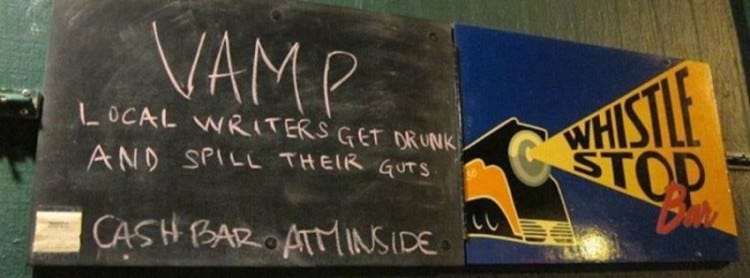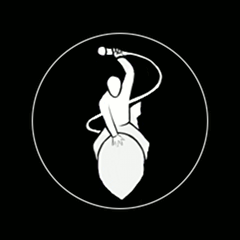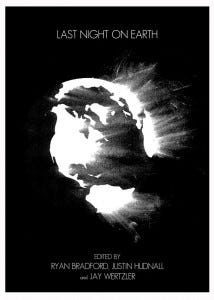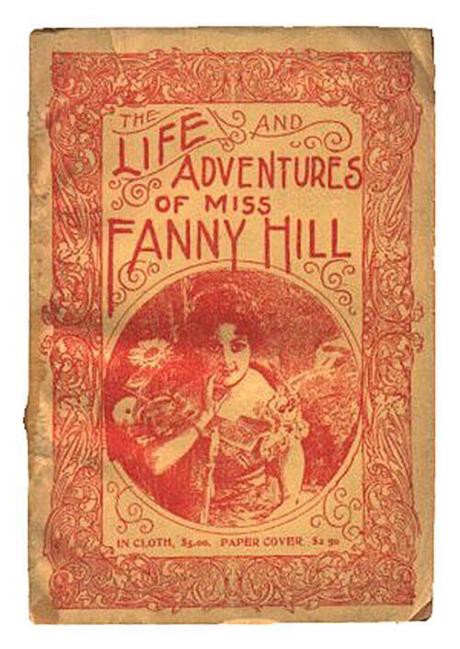interviews
Everyone’s a Writer: An Interview with So Say We All

by Julia Jackson


I moved back home to San Diego last summer, after living in Brooklyn for three years. I knew that one of the things I’d miss about New York was the opportunity to be around other writers — San Diego is not exactly the most literary city in the world. But something had sprung up while I was gone: a storytelling nonprofit called So Say We All which “provides opportunities for expression and arts education to populations without access.”
At the core of So Say We All’s programming is VAMP — that’s Visual Arts and Music Performance Showcase — a monthly show that accepts blind submissions for true stories on a specific theme, such as “Dirty Talk” or “Selling Out.” If your story makes the cut, you go through a workshopping process and are assigned both a performance and writing coach, to help you polish your work. At the end of the month, a reading is held at a popular local bar called The Whistle Stop (which holds around 250 people).
Besides the various monthly showcases and community outreach programs, the group has recently begun putting out books –it’s first release, Last Night on Earth, came out in 2012, and features pre-apocalyptic stories by Amelia Gray, Sunny Katz, Gabe Durham, and Natanya Ann Pulley, among others.
I spoke with Justin Hudnall, the Executive Director of So Say We All, Ryan Bradford, the organization’s Creative Director (who co-edited Last Night on Earth with Hudnall), and Nathan Young, VAMP’s Production Director, to ask them more about the formation and evolution of this unique and vital organization.
— Julia Jackson for Electric Literature
EL: How did So Say We All originate?
Justin Hudnall: Jake Arky [the co-founder of So Say We All] and I were sitting in the back of his pick-up one day bitching about how there were all these things we missed about New York: The Moth, all these opportunities, the scene, the life. I mean, I moved out to New York because I thought San Diego was the asshole of the world, the cultural asshole of America. I was very embittered. One day Jake got tired of me bitching and said: Just fucking do it. So we did. We plotted to put on this one-off storytelling showcase in February of 2009, in honor of Valentine’s Day, called “Love is for Suckers.” No notes, five minutes, just like The Moth. We had so few people everyone had to go twice. But we did it again, and that time we had a line out the door.
In the beginning, I was pulling people out of bars, and getting friends of friends of friends. But that’s what we had to do in order to find these people and get them from under the rocks, the ones who really needed this and wanted it. In 2010 we started doing our first VAMP, which was the first big kids’ show.
Now, we’re functional because of not only us three, but folks like Laura Condi, April Ventura, Matt Lewis, Sunny Katz, Blair Overstreet, and many more.
EL: How did everything else come together?
Hudnall: The storytelling sessions happened for a year. We’ve never stopped doing them — it’s called Long Story Short now — where anyone can just walk up on stage and tell a story. Then we did VAMP, and because of that we had to start teaching creative writing and start editing people’s work. So we started The Green Room to help raise the bar. You can’t teach people how to write, but you can give them the tools. Like, here’s the language, here’s the stuff you need to know.
EL: When did the bar start getting to capacity?
Hudnall: This February, which was our fourth anniversary show. It was apocalyptically beautiful. The bartender ran over to me before the show started and yelled, “We ran out of glasses.” He came back five minutes later and said the bouncer had to stop people at the door. It was like this A Christmas Carol kind of thing. (laughs)
Ryan Bradford: The ragtag team makes good on home turf.
Nathan Young: I’ll kid Justin about this, but when I took over — it was just coincidence but things started to really kick in. We’ll get exposure to new people, a new set of friends, a new social circle, and then they’ll start coming to shows. It’s just been snowballing.
Hudnall: VAMP is so popular that we have to turn people away at these shows. I’m so goddamn grateful that that’s the case. I never thought we would have so many people showing up in San Diego to hear people read. The fact that you can hear a pin drop in a bar in San Diego — I mean, New York has a hard time doing that.
EL: What do you think made it work so well here, in a place where people wouldn’t expect it to?
Hudnall: Part of it’s luck. Part of it is that the people who are making things here either left and came back or they’re from somewhere else. You realize you can do whatever you want [in a city like San Diego]. If you want something here you have to do it yourself. I think that people who’ve been attracted to us are those that are attracted to the blank canvas.
EL: And no one’s trying to impress each other the way they might do in a city like New York or Chicago.
Hudnall: Right. You know no one’s watching. There’s no agent scoping the crowd. Here, it’s just writers who write. In a way, that’s really helped us. You are doing it because you want to be a better person, or a better writer.
EL: What’s unique and important about the performance aspect of VAMP?
Bradford: I think what you get specifically with VAMP that you won’t get in an undergrad workshop, is that rather than just workshopping your story, you’re also getting performance training.
Hudnall: And we don’t let you slide by. We’re really rough.
Bradford: So it’s this kind of therapy process, where you’re broken down and built back up to be able to perform on stage.
EL: Just like the army.
Bradford: Right. Ten-hut. Make note that Ryan Bradford just did ten push-ups.
Young: People get challenged to figure out: “Why did I do this? Why did this happen?” I don’t think you get asked these questions very often in your life. Why did you hook up with this person, or do all those drugs? It’s easy to write it off and say, “I was young,” or “I was drunk.” In normal conversation these are completely valid reasons, but you can’t go up on stage and perform a piece and say, “It’s cus I was drunk.” It just doesn’t fly. We have to get at the deeper issues of why you were drinking all the time, or sleeping with these random people — these tend to be common themes (laughs). I think it’s comforting to hear other people express their crazy side on stage, and then to see that everyone in audience gets it. Then you realize that none of us are really that crazy.
Hudnall: I really do believe that repression makes you sick. I’m big believer of what is coming out in the neuroscience and therapy community. Brene Brown, who is a shame and guilt expert, said it best: “We have an epidemic of shame in this country.” If you keep things inside and have no one to talk to — and this is not crystals and patchouli — you will get sick, you will be miserable, you will ruin your relationships, and you will be unhappy. I know people whose lives were ruined by silence. Especially women. The one thing that has really opened my eyes while teaching is just what we do to our women. Only my women students have said to me, “I don’t know if I have anything worth saying.” It smacks me in the face every day. We are really fucking up our women.
EL: You guys have begun some outreach work with blind students, correct? What led to that?
Hudnall: The truth is: most of San Diego’s not going to come to us. Part of the nonprofit mission is to give the opportunity to have a voice heard from populations we don’t hear anything from. People with disabilities, people with trauma, prisoners. We [as a society] think that with blind people, “Oh it’s hard to get around.” But the secondary aspect is that humanity has an inherent ability to not look at things they don’t have a comfort level with, and disabilities is one of them. I think it’s very lonely to be disabled. You are unintentionally shunned, in a lot of ways.

EL: How did Last Night on Earth come together?
Hudnall: I started thinking about what one would do if the world was going to end in 24 hours, and started asking everyone I knew what that would be. I’m a big fan of radio dramas and was always thinking about stuff like The War of the Worlds, but if you took the aliens out — and it became this kind of obsession for me for a while. And then I told Ryan about it and he validated it by saying it wasn’t a bad idea.
Bradford: We were at my house drinking whiskey one night, and we were both going through some sort of artistic depression — this was early 2011 — and it resonated with 2012, and I was like, holy shit, this is a great idea. The concept seemed so simple.
Hudnall: I was in New York for 9/11. After, I became obsessed with the thought that you’re going to have to know you’re going to die to really be able to appreciate being alive. You don’t believe you’re going to die because we can’t understand what it means to not exist. We can’t wrap our minds around it because we’ve never experienced it before. So we posed this question to a lot of people, and it was like the pants-dropper, something you’d really keep at arm’s length emotionally as friends. You put them in a room and ask them what it’s like to die, knowing they have kids and family — they come back with the hard stuff. But it wasn’t dark, necessarily.
Bradford: I wouldn’t call it dark at all. I’d say, despite the title, the book comes off as fairly optimistic.
Hudnall: The thing we’re trying to hit in our publishing — the best thing we can offer — is that there’s no point in publishing something that’s a vanity publication. We take the art very seriously. We won’t put out a bad product, because that will end us. That said, I think everybody’s a writer. It’s storytelling. It’s the one thing everyone has to do in the arts.
EL: Do you have anything else you’d like to add?
Young: I just think this is really cool –I’ve really enjoyed doing this, and being around so many cool interesting people. I make new friends every month. It’s so nice to see my life turning into this thing I’ve always wanted but never knew how to get. Prior to this, it would be every once in a while, at like a dinner party or something, where I’d have these interesting, deep conversations that were intriguing. Now I get to have those kind of nights regularly. The VAMP workshops are a room full of smart, interesting, expressive people — talking about what’s going on with themselves and each other in a respectful way. It has fucked with me a little bit, because now I go out to bars and have small talk, chit-chat kinda bullshit, and I’ll just think, I don’t have time for this. I don’t want to talk about this shit.
Hudnall: I think there’s a literary revolution going on. We got too precious. For a while, all the prizes were going to these fucking middle-aged white guys from New England who were writing about a neurotic middle class family. Do we really need another book like that? I just got this book, This is Where I Leave You [by Jonathan Tropper], and it’s very well-written — you can tell he went to college for this stuff. But do we need another book about a neurotic, middle-class, Jewish family who goes back home to sit bedside by their dying, neurotic father? No we fucking don’t. Because the world’s on fire, we’re torturing people, and our money’s no good. There’s more issues going on. We need to hear from new voices. We need to hear out of New England.
Do you like what So Say We All is doing, but don’t live in San Diego? You can still donate!
***
— Ryan Bradford’s writing has appeared in Quarterly West, Paper Darts, Vice, and [PANK], and he’s the founder of the literary horror journal, Black Candies. He lives in San Diego. Find him here.
— Justin Hudnall holds a BFA from New York University. When not faffing about in the arts, he served with the United Nations in New York and Southern Sudan.
— Nathan Young is currently enjoying career number seventeen as a writer and production director for So Say We All. He lives in a treehouse.
— Julia Jackson is the Contributing Editor for The Outlet, and an internet ghost.









